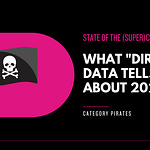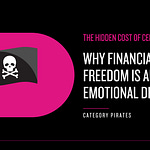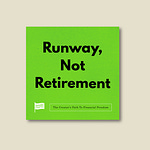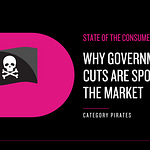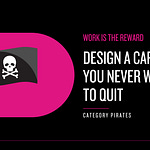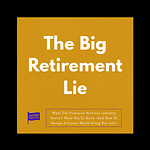This is a paid edition of the "Contributing Pirate” series, written by a successful Category Designer who has effectively carved out a niche in their market. These guest contributors are hand-selected to share their unique insights, experiences, and stories—in their own voices. The goal is to explore new territories in category design and creation, directly from those who've navigated these waters successfully!
To give context to their writing, we Pirates share our take on their work and explain how they connect to the broader landscape of category design.
Dear Friend, Subscriber, and Category Pirate,
In the late 90s, no one talked about “experiences” as a product.
So when Joe Pine and James Gilmore dropped the bombshell concept of the Experience Economy back in 1999, they flipped the script on traditional business strategy.
At a time when most companies were duking it out over product features or price wars, Pine and Gilmore threw down the gauntlet: the real money, they argued, was in crafting incredible experiences.
They said, "Forget just selling stuff. Sell the memory, the vibe, the whole damn show."
This was radical because it vaulted experiences from the background to front and center, treating them as a product you could design, sell, and deliver (like a latte or a laptop). It wasn’t just about the coffee but about the buzz of the cafe, the velvet touch of the sofa, the indie music (softly) playing—elements that turn a coffee run into a mini-escape.
Today, the “experience economy” is everywhere.
Everything Airbnb does revolves around an experience—whether it’s going on a tour with a local guide, getting detailed “experience” itineraries, or waking up in the Musée d’Orsay on the day of the Opening Ceremony of the 2024 Olympic Games in Paris. (Pirate Katrina’s dream!)
And there are “experience” examples across almost every industry:
Disney: Disney is the quintessential example of an experience-focused company. Whether through its theme parks, cruise lines, or entertainment productions, Disney excels at creating magical experiences that are both immersive and memorable. The company's theme parks transport visitors into fantastical worlds that make them feel as though they are part of their favorite stories. It even has a “My Disney Experience” app to help visitors navigate the parks.
IKEA: IKEA turns shopping for home furnishings into an experience, from the layout of its stores that encourages a winding journey through various room setups to the in-store cafeterias serving Swedish food. The overall design beckons visitors to envision their lives with IKEA furniture in them.
Starbucks: Starbucks transformed the coffee shop experience by creating a "third place" between home and work where customers can relax, meet friends, or work while enjoying their coffee. It’s not just about selling coffee. It’s about the ambiance, the service, and the consistent experience across all its locations worldwide.
Apple: Apple stores are a great example of the experience economy at work in retail. These stores provide a hands-on experience with products, workshops, and a clean, minimalist design that emphasizes the products and the experience of using them. The Genius Bar provides personalized tech support, turning a simple visit to the store into a total tech experience.
Virgin Atlantic: In the airline industry, Virgin Atlantic designed its own category of experience by focusing on the passenger experience. From mood lighting and upscale lounges to on-board bars and innovative seating configurations, Virgin Atlantic aims to make flying a pleasure rather than a chore.
Each of these companies shows how integrating experiences into their offerings can elevate their products, create deeper customer loyalty, and position their category as something new and different.
The Experience Economy has morphed with the tech tide, making experiences more personalized, more Instagrammable, and way more immersive.
Social media cranks up the need for experiences to be share-worthy—nobody’s posting a bland meal or a dull hotel room. And with VR, AR, and AI in the mix, we’re not just talking about jazzing up reality but creating new ones.
Now, consumers aren’t just buying.
They’re part of the show.
It’s not just what you sell, but how you make people feel that hooks them in for the long haul.
They expect to roll up their sleeves and dive into the experience, influencing and shaping it as they go. This is the playground where they want to co-create, tweak to their taste, and put their own stamp on the experience. And as the global market keeps leaning hard into services, standing out is tougher than ever.
That's where experiences swing in like a hero.
Joe Pine’s early vision of the Experience Economy laid down the tracks that have led to a vast, vibrant landscape where experiences are the main event. And it’s constantly evolving with new tech, deeper consumer involvement, and a relentless push for the next big thing that’ll connect with customers.
Building on this foundation, Joe Pine introduced the Hero's Journey as a transformative tool within the Experience Economy.
This concept, drawn from Joseph Campbell's universal motif of adventure and transformation, lets companies reframe their customer interactions as narrative-driven adventures.
By applying the Hero's Journey, businesses design each phase of the customer experience as part of an overarching narrative, transforming customers from passive recipients into protagonists of their own stories.
In this narrative-driven model, customers face challenges, receive guidance, overcome obstacles, and ultimately achieve a transformational victory.
For example, in healthcare, a patient's journey through treatment can be seen as a heroic quest against illness, with providers acting as mentors. In financial services, guiding clients toward financial independence becomes a journey of overcoming trials to reach a rewarding retirement.
This use of the Hero's Journey does more than enhance a customer’s experience.
It connects on a deeper emotional level, creating a sense of accomplishment and resonance that's so important for building a community of dedicated Superconsumers.
This narrative approach shifts the interaction from transactional to emotionally engaging and personally significant. It embodies the core of value creation in the Experience Economy. And today, we’re hearing about it from Joe Pine himself.
This “Contributing Pirate” mini-book is by the legendary Category Designer Joe Pine.
Co-author of The Experience Economy, Joe Pine II is an internationally acclaimed author, speaker, and management advisor to Fortune 500 companies and entrepreneurial start-ups alike.
Joe has been on a decades-long mission to show companies how goods and services are no longer enough. Instead, they have to offer experiences—memorable events that engage each customer in an inherently personal way. The economic competitive reality of the future is fast-paced change. At his firm Strategic Horizons, Joe helps clients design strategies to leverage these new economic opportunities and create experiences that drive revenue.
Now, let’s dive into Joe’s take on how making your customers the heroes of their own story can transform your product, company, and category.
The Hero’s Journey
Goods are inventoried after production, services are delivered on demand, and experiences—transformative experiences included—are revealed over a duration of time.
Experience design is the design of time, as I learned from the late famed architect, Jon Jerde, and dramatic structure shows how the complication or intensity of an experience changes over time—rising up to a climax and coming back down again—and thus do experiences become memorable.








